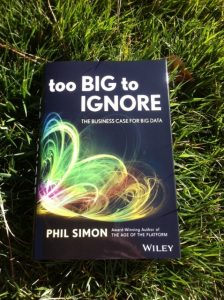 I recently attended the O'Reilly Tools of Change for Publishing Conference in New York, and I have to confess, I had a Twitter eureka moment. I was sitting in a conference room, waiting for the next session to start and reading tweets from a publishing industry contact I've longtime admired and followed. I love what she has to say and how she says it, and as I scrolled through, I laughed out loud at her insightful commentary on … the conference session I'd just attended. And then she started tweeting about the next session, from the same room. I geeked out, recovered, and connected with her both online and in person, and we had a fantastic conversation from there.
I recently attended the O'Reilly Tools of Change for Publishing Conference in New York, and I have to confess, I had a Twitter eureka moment. I was sitting in a conference room, waiting for the next session to start and reading tweets from a publishing industry contact I've longtime admired and followed. I love what she has to say and how she says it, and as I scrolled through, I laughed out loud at her insightful commentary on … the conference session I'd just attended. And then she started tweeting about the next session, from the same room. I geeked out, recovered, and connected with her both online and in person, and we had a fantastic conversation from there.
It was a eureka moment, when something I thought I was completely familiar with became new again. I think many will feel the same way reading Phil Simon's new book, Too Big to Ignore: The Business Case for Big Data. Yes, we've all heard of Big Data, perhaps even read about it. But often when it comes to this topic, you can have a lot of people in the same space without a common realization.
I asked Phil, "What are the most important points to know and share when it comes to Big Data?" Here's what he had to say:
- Big Data is a term that represents the massive amounts, new types, and multi-faceted sources of information that are streaming at us faster than ever. Never before have we seen information at the volume, velocity, and variety of today. Examples include YouTube videos, tweets, Facebook likes, call detail records, data from sensors, podcasts, clickstreams, and so much more.
- Big Data is not a blip or a temporary fad. It's only going to intensify in the coming years, and its ramifications for the future of business are impossible to overstate.
- The time for Big Data is now. Big Data and its related tools are allowing organizations to interpret previously unimaginable amounts and types of data. In the process, the most progressive organizations are harnessing significant value from the petabytes of unstructured data that we now call Big Data. .
- When most of us think of data, we think of orderly information—spreadsheets, databases, lists of customers or transactions, etc. The era of Big Data has arrived, but this "small data" is still very important. Big Data, for the most part, represents unstructured data—text-laden, messy, big information that you can't represent particularly well in a spreadsheet. About 80% of the information generated these days is of this unstructured variety.
Find your big data eureka moment with Too Big to Ignore. Order your copy today.
1 Comment
Big data => big distrust of the "analysts" messed with it, there is not enough well-trained people to handle the mess; most people quit in 5 years. So eventually "small data" becomes the beautiful again. Mr. Simon, we can tell he is not a statistician.